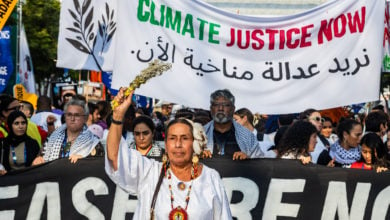Photo: Julian Assange after his release on a flight to Australia. Credit: X/@wikileaks
On July 12, 2007, two U.S. Army Apache helicopters were hovering over the al-Amin al-Thaniyah neighborhood of Baghdad in Iraq. The helicopters were observing groups of men below in the streets, later to be revealed to include two journalists for Reuters. In the video, an Apache crew member requests authorization, claiming one man had a rocket-propelled grenade. This was later debunked, as it was actually a telephoto lens by Reuters photojournalist Namir Noor-Eldeen.
After receiving the go-ahead, the Apache crew strafes the group of men with 30mm machine gun rounds, machine guns that have a practical rate of fire of 300 rounds per minute. As these unarmed men are torn apart in a matter of seconds, the Apache crew members joke with each other on the audio recording, saying “Hahaha. I hit ’em,” while the other crew member responds, “Oh yeah, look at those dead bastards”.
What could have been just another normal and unknown instance of U.S. war crimes in Baghdad now lives as a mark of shame on the long history of U.S. imperialist crimes, known today as the “Collateral Murder” tapes. The only difference is this act of imperialist cruelty was courageously published by Wikileaks and its founder Julian Assange.
This week, after more than a decade of persecution, attempts to illegally extradite and even assassinate Julian Assange, the journalist who exposed these crimes of Washington returned to Australia after striking a plea deal with the U.S. Department of Justice, sparing him any additional prison time.
The deal can only be seen as a victory for those that have tirelessly dedicated themselves to the legal defense and international solidarity efforts to ensure that the truths revealed by Assange and Wikileaks cannot be smothered into silence and complicity. The political imprisonment of Assange by the United States, using the United Kingdom as a willing assistant along the way, was nothing but a failed attempt to punish those that bring horrors of the Pentagon out of the darkness.
Wikileaks’ role in exposing the U.S. war machine
The great import of Wikileaks reporting exceeds not just that of the U.S. war on Iraq and Afghanistan. In 2011, Wikileaks released cables that highlighted the role that the U.S. Embassy in Honduras, led by Hillary Clinton’s State Department under the Obama Administration, played in the 2009 coup that overthrow democratically-elected President Manual Zelaya. After Zelaya was ousted, the U.S. Embassy immediately began contacting Honduran capitalists and elites to accept the removal of the President.
In the same year, a U.S. Embassy cable released by Wikileaks confirmed what the Bolivian government in 2009 alleged regarding a U.S. government conspiracy to assemble a team to assassinate then-Bolivian President Evo Morales. While senior U.S. diplomat Krishna Urs originally denied U.S. involvement, the cable revealed that a key financial backer of the plan was a “close embassy contact” to the mission of the U.S. Embassy in Bolivia.
In 2010, Wikileaks published around 76,000 leaked U.S. intelligence documents regarding Washington’s occupation of Afghanistan. The leak ended up totalling over 91,000 documents relating to the Afghan War, one of the largest in U.S. military history. The logs revealed that hundreds of civilians were killed in unreported incidents. Further, the leaks ran contrary to the narrative put out by the Pentagon that the U.S. operation was winning the hearts and minds of the people of Afghanistan. The documents revealed many acts by the United States in Afghanistan, including details regarding the usage of Reaper drones to assassinate individuals remotely from a base in Nevada, and paying off local Afghan media to run stories friendly to U.S. interests.
For decades, the United States has been forced to conceal and hide its true aims of economic and political domination of the globe, cloaking these goals in noble causes, such as the pursuit of “democracy” and “human rights.” Without these fabrications the people of the U.S. would not tolerate the horrors and terrorism that is carried out in their name and by their dime.
Julian Assange cast a spotlight on these illusions. His release should not only be a cause for celebration, but a call to pursue justice against the criminals he and Wikileaks exposed.





